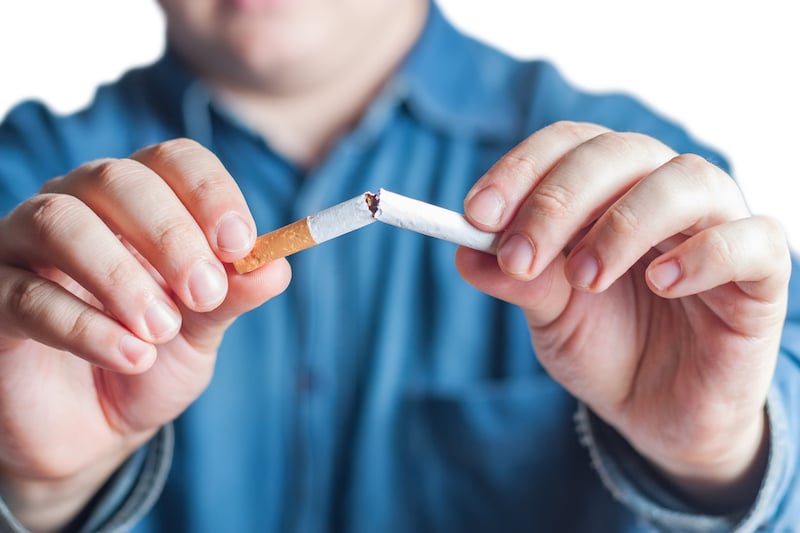If you’ve decided that quitting smoking is your 2017 New Year’s resolution, then here’s another reason to make sure you make this resolution stick: the affects that smoking has on your oral health.
Thankfully, it is now a well-documented fact that smoking is detrimental to basically every aspect of your health. Lung cancer and cardiovascular disease seem to create most of the headlines when it comes to warnings about smoking but what about its effect on oral health?
Usually people point to yellowed teeth and bad breath when it comes to smoking and oral health but in reality smoking can have far more devastating effects.
So, if you need a little more inspiration to quit or you want some facts to tell a loved one, here are just a few ways that smoking can affect your oral health:
Oral Cancers
 Smoking can cause basically any oral cancer you can think of. In fact, smoking causes 80% of all mouth, throat and nose cancers. The numbers are even more terrifying when you look at the amount of people that die as a result of mouth and throat cancer, with over 4,000 new cases emerging every year. Even a social smoker is nine times more likely to develop these types of cancer while a pack a day smoker is sixteen times more likely to suffer from these horrible cancers.
Smoking can cause basically any oral cancer you can think of. In fact, smoking causes 80% of all mouth, throat and nose cancers. The numbers are even more terrifying when you look at the amount of people that die as a result of mouth and throat cancer, with over 4,000 new cases emerging every year. Even a social smoker is nine times more likely to develop these types of cancer while a pack a day smoker is sixteen times more likely to suffer from these horrible cancers.
Gum Disease
The numbers aren’t any better when it comes to the relationship between smoking and severe forms of gum disease. Smokers are 2.5 to 3.5 more likely to suffer from bone loss in the gums due to gum killing properties of tobacco smoke. That means that smokers lose more teeth than non-smokers and due to the loss of bone density they are also far less likely to be able to receive successful dental implant treatments.
It’s also important to remember that smoking constricts the blood vessels in the mouth, meaning smokers bleed less than non-smokers. This often leads smokers to believe that they have healthy gums because they don’t bleed when they brush or floss when really this is a result of the negative impact that smoking has had on the health of their mouth.
Smokers also have lesser healing properties than non-smokers meaning they don’t respond as well to periodontal treatment.
Tooth Decay
Smoking wreaks havoc with the way our mouths respond to bacteria. Our mouths are full of bacteria and a healthy response to it is key in preventing tooth decay and other oral health issues. Smoking weakens our mouth’s ability to deal with bacteria meaning smokers suffer from higher rates and worse forms of tooth decay, once again leading to tooth loss and gum disease.
Smoking also exposes the roots of teeth and reduces the saliva flow of the mouth, both of these factors increase tooth decay and opens up smokers to a lot of visits to the dentist.
Aesthetics
Those gruesome pictures that you see on cigarette packets showing decayed, stained and missing teeth aren’t a scare tactic – they’re a window into how a mouth can look after years of smoking. The reasons for tooth loss are mentioned above but the tar and nicotine in cigarette smoke actually sticks to teeth and stains it over time.
If you have smoked for too long and the stains have set too deeply there’s a chance your teeth won’t respond to whitening treatments. If that is the case, you may have to turn to more expensive and invasive forms of treatment to get your smile back and turn back the years of self-inflicted damage.
Smoker’s melanosis is another unattractive aesthetic feature of smokers. Tobacco smoke stimulates melanin production, which causes between 5 and 21.5% of smokers to develop unsightly brown spots in their mouth.
If stains and brown spots are a scary thought you don’t even want to hear about hairy tongue (overgrown tongue papillae) or smoker’s palate, both of which are directly linked to smoking.
Hygiene
Smoking’s effect on your ability to deal with bacteria opens you up to more than just tooth decay, it can also cause nasty problems such as oral thrush, which is a form of fungal infection in your mouth.
Bad Breath
Yes, those warnings your mum gave you about nobody wanting to kiss a smoker are true. Smoking causes bad breath due to a number of factors. Firstly, smoke particles remain in your lungs, throat and mouth meaning that your breath starts to smell like an ash tray. Secondly, chemicals from tobacco smoke can remain in your mouth leaving halitosis causing pyridines and pyrazines in your saliva.
The above is just a brief run through of the effects of smoking on oral health. The reality is, smoking causes an array of oral health problems and also inhibits the ability of your dentist to address these problems.
If you love your teeth and more importantly love your health, contact our dentists in Camberwell or your doctor and discuss the ways in which you can stop smoking.

